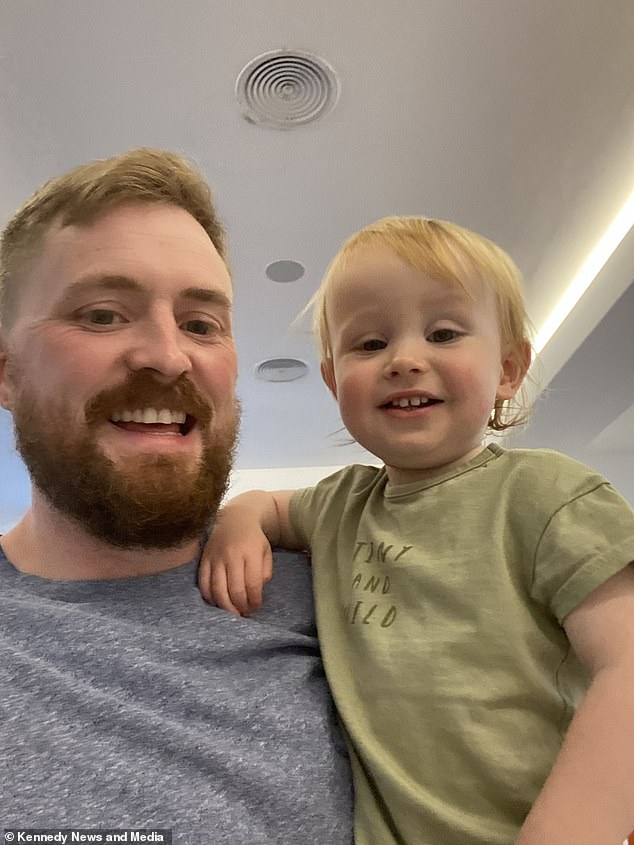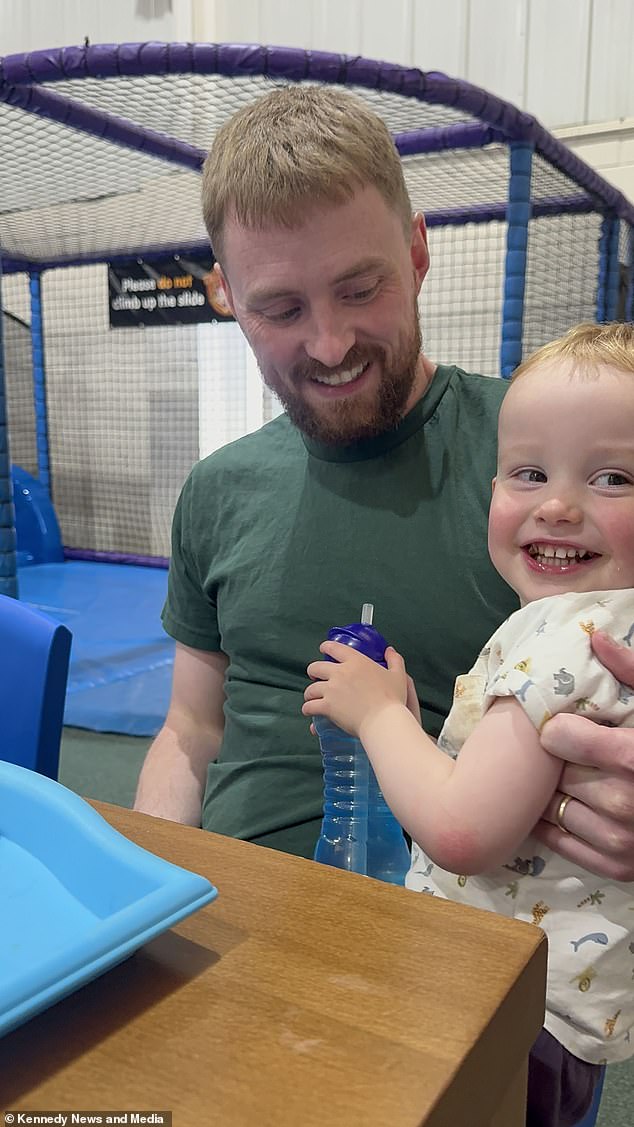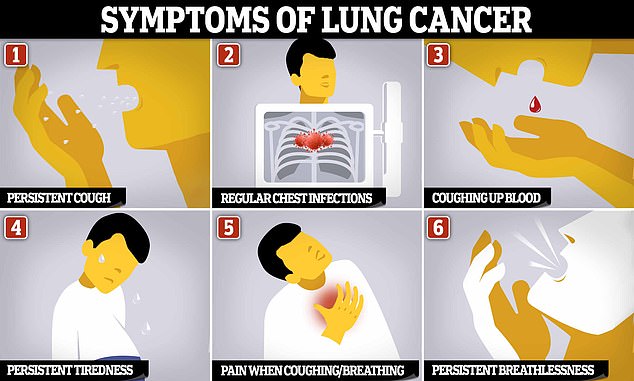Father of three, 35, reveals his shock as three-month 'tickly cough' turns out to be terminal lung cancer... having never smoked a day in his life
A father of three has told of his horror after his 'tickly cough' turned out to be terminal lung cancer, despite never smoking a cigarette before.
Lewis Daines, from Crawley in West Sussex, suffered the persistent cough for three months before visiting his GP in February.
But it was only after he began experiencing pain in his shoulders and chest that he visited A&E, where he was diagnosed with pneumonia.
The 35-year-old was forced to return just two weeks later, however, after his symptoms failed to subside.
Scans showed the advanced nurse practitioner had a cancerous golf ball-sized mass in his right lung.

Lewis Daines, from Crawley in West Sussex, suffered the persistent cough for three months before visiting his GP in February. But it was only after he began experiencing pain in his shoulders and chest that he visited A&E, where he was diagnosed with pneumonia. Pictured, Lewis with son Barney

The 35-year-old was forced to return just two weeks later, however, after his symptoms failed to subside. Scans showed the advanced nurse practitioner had a cancerous golf ball-sized mass in his right lung. Pictured, Lewis with wife Vicky Daines

Devastatingly, further tests revealed the cancer was also present in his bones and adrenal glands — small triangular-shaped glands on top of both kidneys — meaning it was classed as 'end-stage' and incurable. Pictured, with Aurelia, 3 and Barney, 2
Devastatingly, further tests revealed the cancer was also present in his bones and adrenal glands — small triangular-shaped glands on top of both kidneys — meaning it was classed as 'end-stage' and incurable.
Mr Daines, who has two toddlers with a third baby due this week, said: 'Back in December, this dry cough started that just never went away.
'There was this 100-day cough going around and I was seeing sick people on a daily basis so I didn't think much of it.
'I was managing it and still doing my day to day stuff like going to the gym. I finally went to the doctors in February time and the doctor checked me over and came to the conclusion that it was just a cough. They weren't worried.
'I started getting these really bad pains in my shoulder and chest. My wife convinced me to go to A&E because she was getting worried.
'They did a chest x-ray and told me I had pneumonia and gave me two lots of antibiotics.'
Recalling his heartbreaking cancer diagnosis, he added: 'I was completely shocked.
'I thought worst-case scenario it might be cancer but could be removed. So when I was told it was incurable, it was quite hard to take.
'They think it might have been growing there for a couple of years but there were no real symptoms.
'It's a case of buying time rather than curing. Without treatment, the timeline is around four to seven months.
'With treatment, they just don't know it's how you respond to treatment. You could respond quite well and have a couple of years, they just don't know.
'Having a really young family and a wife, you just lose everything. It's all been one setback then another.
'The hardest bit is not being able to see my children grow up and miss out on all of that.
'My wife is nine months pregnant so it'll be nice to be here for the birth. This is never anything that would've crossed my mind in a million years.
'I had no symptoms prior to the cough — I was going to the gym every night, don't drink, don't smoke.
'You get quite angry and think "why me?" when people have smoked their whole lives.'
Lung cancer is the world's biggest cancer killer. It is notoriously difficult to diagnose and often appears later when it's harder to treat.

Mr Daines, who has two toddlers with a third baby due this week, said: 'Back in December, this dry cough started that just never went away. 'There was this 100-day cough going around and I was seeing sick people on a daily basis so I didn't think much of it'. Pictured with son Barney

Now, Mr Daines is urging everyone to push doctors if they are concerned about their symptoms — and take out life insurance at a younger age. Pictured, Lewis' wife Vicky Daines with daughter Aurelia

Symptoms of lung cancer are often not noticeable until the cancer has spread through the lungs, to other parts of the body
Around 50,000 people are diagnosed with the disease in the UK and 230,000 in the US each year.
Figures show it kills four out of five patients within five years. Fewer than 10 per cent of people survive their disease for 10 years or more.
Despite the progress, a disparity among sexes is emerging, with women between the ages of 35 and 54 being diagnosed with lung cancer at higher rates than men in that same age group.
Cigarette smoking remains the leading cause of lung cancer.
Now, Mr Daines is urging everyone to push doctors if they are concerned about their symptoms — and take out life insurance at a younger age.
He said: 'Don't be afraid to push if you think doctors are fobbing you off. You know when something isn't right, keep pushing for these checks.
'I wish I'd taken out life insurance. It's not something you usually think about in your thirties.
'I feel like the biggest burden to my family. I'd encourage everyone to take out life insurance.

While the level of progress for cancer survival for some forms of the disease has been rapid, such as for breast and prostate cancers, others, like those for lung and pancreas have only improved at a snail's pace

'You think you're invincible and it won't happen to you — certainly at this age — but it would've helped us so much now.'
A GoFundMe page, set up by Mr Daines to help provide financial security for his family as his condition worsens has raised more than £46,000.
The health service is currently grappling with a post-Covid backlog of cancer referrals, with latest NHS data showing more than 9,000 patients did not start cancer treatment within two months of an urgent referral from their GP.
It means just six in 10 cancer patients (65.8 per cent) were seen within the two-month target.
NHS guidelines state 85 per cent of cancer patients should be seen within this time-frame.
But, this target has not been met nationally since December 2015.

























































































































































































































































































































































































































